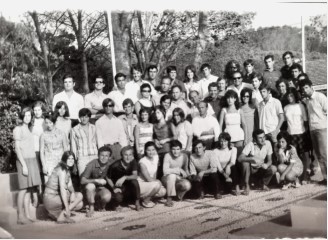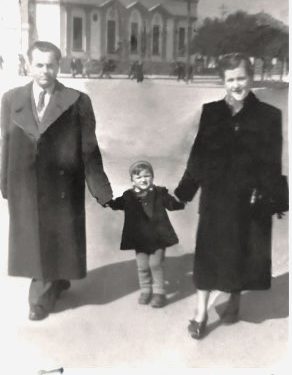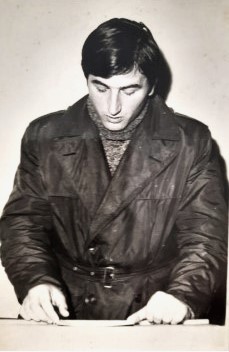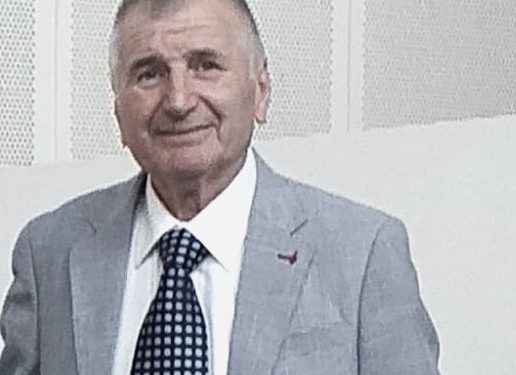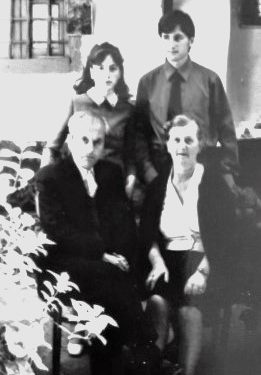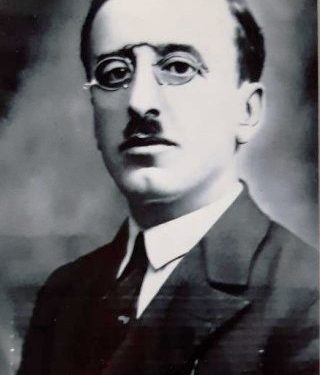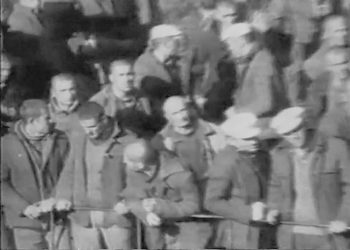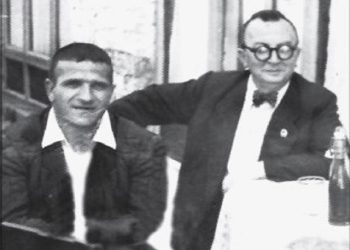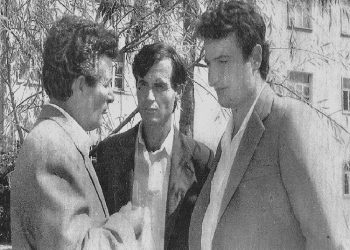By Nestor Topencharov
The tenth part
THE DRAMA OF LIFE
(THE STORY OF A FAMILY)
I dedicate this book to: All fellow sufferers. Their families. And in particular, to people who did not have the opportunity to tell the odyssey of life, during the communist dictatorship.
FORE SAYING
Memorie.al / I were born in the city of Korça, on October 22, 1953. I left Albania in October 1990, after we were given the right to repatriate to Yugoslavia (now North Macedonia) ). In June 1992, I emigrated to Italy, where I still live today. Although I have been away for 32 years, I did not cut ties, as Albania was the country of my birth, where I spent 37 years, and that part of my blood is Albanian. Years later, the ties with Albania were strengthened, as I also took my wife from Durrës. We came every year on vacation, but the short time of our stay meant that many contacts were cut off. However, true friends and comrades remained forever in my heart.
In the last three years, I did not have the opportunity to visit Albania. But during 2022, I came several times. My commitment on the one hand and the coincidence on the other, made it possible for me to re-establish connections with friends and colleagues whom I had not seen for decades. Knowing my past, some of them advised me to write down what had happened in my life. At first, this idea seemed like a utopia to me, since even though I had been a good student; I had no inclination towards drafting. Then I reflected. I would just write my story, true events, where not much inspiration was needed. Perhaps a writer would know how to present these events, as a true pen artist knows. While I will write them, without many descriptions: briefly, simply, naked, as they happened.
Something else that pushed me even more to write this book was an interview on TV Klan, which I saw in October of this year, directed by the well-known journalist Blendi Fevziu. I didn’t seek revenge. But I didn’t even have justice. With the help of this book, I will make known to the Albanian public opinion, the role of the individuals who contributed to my suffering and that of my family. And today, I am putting my finger on these “beings”, not for the task they had, but for the way they performed it. I will start my writing with my grandfather, from my mother’s side, to continue with my father, where I will touch on the most important moments of their lives. This will help the reader to know my background.
Then I will also talk about myself. In this book I will also tell some events, one more dramatic than the other, that happened to people I had the honor of knowing. I am glad that many books have been published on the suffering and persecution of “enemies of the people” and their families in internment camps and prisons during the communist dictatorship. I was able to read some of these works. I believe that this book, in a modest way, will contribute to know even more the inhumane methods of the State Security, the way they created accusations and how they destroyed people and families to keep the people under terror.
Author
December, 2022
Continues from last issue
CHAPTER THREE
It was the end of July. In the morning, the gate was opened and they told me that they would transfer me to Tirana prison. I was the only one from this group, whose name was called. After I said goodbye to my fellow sufferers, they put the irons on me and took me out to the yard, where the auto-jail had arrived. Some prisoners were near the truck, others were being brought from other buildings. They chained us two by two. They put me in touch with an old man, whose name I found out along the way was Kita.
About it, I told you above, from what I learned from Andrea. He also told me that he knew my father and that was good for me. The journey in that sheet metal truck was very difficult for us. Everyone’s physique was weakened, in the difficult conditions we had been through. It was very hot inside. During the journey, our bodies bumped from side to side. The environment became more difficult, when some of us got mixed up, especially in the curves of Qafë-Krraba.
We finally arrived in Tirana, late in the afternoon. Kita held me close, like his son. The room they put us in was very large and with bunk beds. On them were old mattresses and blankets. In these premises of the prison of Tirana, there were many convicts. A part, like our work, came after the sentence to be divided into labor camps (re-education wards), as the dictatorship propagated. Some of them were going to or coming back from the hospital, due to serious health problems.
Others, after the re-conviction, were also taken, again, to various labor camps, including the Burrell prison. In short, that place had a lot of movement. As soon as we entered that hall, 3-4 men who knew him gathered around Kita and started greeting him. One of them turned to me and spoke to me in tongues…! Kita interjected, introducing me as the son of a friend of his, but that I didn’t speak their language. Kita was of nomadic origin.
All around them, they spoke in Vlach and Greek. That dinner, I felt among friends. The next morning, after breakfast and tea, they began to read the names of a list for Spaç. I was among them. I greeted Kita and thanked her for her care. I met him many years later, when he was released, on a visit I made to his home. With his son, Koçon, I worked in the Artistic enterprise.
We were tied up again two by two and after getting into the vehicle with the sheet metal, we took the direction of Spaci. I had not rested well from the previous day’s journey, and here we were again on the road to hell. The bad road, took out our souls, all of us. In the afternoon we arrived at ward number 303. Spac. After passing several checkpoints, we were stopped in a square that was surrounded by the buildings of the command and the military department. When I got out of the car-jail, I look at that bare and rugged mountainous terrain.
Between the mountains ran a small stream where the water had a strange color and the banks were red. Above my head was only a patch of sky, which became even smaller as I descended into the area of the camp where the prisoners were. This was the place where I would live until I served my sentence. They took us to the technical office. This office was run by prisoners. The chairman was a former agronomist from Durrës, Kujtim Zhari. Here was the organization of the brigades of convicts, who worked in the mine. They were divided into two groups: 1 – underground workers and 2 – surface workers.
In the second, the office workers also entered. There was also a construction team. The rest, which included the elderly and those with health problems, were in a group called; “unemployment”. As for the maintenance of the enclosure, there was a small group of ordinary prisoners, who had their own dormitory, outside the political camp. In the technical office, there was also Qirjako, a convict for escaping. He was old in age, originally from the villages of Lake Prespa.
He was interested when he saw my last name. I told him that my father was from Ohrid. Young people like me were immediately taken underground. Apparently Qirjako wanted to help me, seeing my weakened and pale physique, almost 10 months, without seeing sunlight. He tells me that he would assign me to the inclined plane, in the second zone. At the moment, I did not understand what work I was going to do, but I thanked him.
Then we were given the prison uniform, brown colored meringue jacket and trousers, soldiers’ underwear and a pair of rubber o-rings, as shoes were not allowed. This was the uniform of the camp. After I put them on, I was no different from the other convicts of Spaci. The room where I was assigned was the one where most of the convicts worked in the office and on the surface.
The door and windows were on the same side. In front of us was the appeal terrace and behind it, there were barbed wire fences and guard towers. Below ran the stream, from where the other side of the mountain rose, to close the view. Winter and summer, the door and windows were constantly open, to create opportunities for more fresh air to enter. Even so it was insufficient.
The shared beds were made of wood, with three floors. When the palaces were built, 28 convicts were programmed in each room. Now more than 50 people slept in this room. There were quite a few rooms that had bunk beds and in a short period of time, they were also transformed. To cope with the rapidly growing needs of the number of prisoners, the width of the mattresses was also reduced. The courtyard, in front of the two palaces, was full of people. I saw groups of people walking along the courtyard. Others were sitting on the steps of the terrace or on benches.
I too found a seat and sat down. Someone asked me where I was from. Several policemen approached me to greet me, to know about the punishment and to say some encouraging words. From my city, there were many convicts. Among them, I didn’t know anyone. Most of them had very severe sentences. I am not naming names, as there are many. I remember them with respect. The day after I had arrived, the tellalli called Dhimo, an old minority man, mentioned my name meeting with the family.
Climbing the stairs to the upper gate, where the meeting took place, it seemed incredible to me, the arrival of family members. At the outer gate with bars, there was the mother with her sister, with two bags resting on the ground. We met, only shaking hands, because the bars that separated us did not allow us to hug. On the day of the meeting in Korça, you were told that I had left for Tirana that morning. So the next day, they left for Tirana. But the same thing there, and now finally in Spac.
In short, they had made the stages of my journey, one day late each. I was sorry that they had suffered, but it was clear to me that for my people, from now on there would be only pain and suffering. After 10-15 minutes, the meeting ended. They had brought me food and clothes. During these minutes, there was the presence of the police, who at the end of the meeting checked the bags. The food was given to me, but the clothes were returned. I was shocked by that meeting. My father had been arrested 6 months before me and had not yet appeared in court. Mother and sister were left alone, in a difficult economic situation.
The next day the organic was read and the day after, on August 1, I started work on the sloping plan, in the second zone. Our task was to; all the copper and pyrite material that came out of the underground had to be transported to the trimozats where the trucks were loaded. The wagon road was not long, about 150 meters, but it was quite steep. When it was dry, although there were two of us pushing the wagon, it was very difficult. I was assigned to work with a fellow sufferer who had been a Catholic priest. He was about 45 years old. He was the youngest of all the other priests we had in Spac. His name was Martin.
He was a silent man. He spoke a word, only when there was a need for work matters. At that time, I didn’t have much power, but Martin made up for it by pushing himself harder. I remember in the investigator, in the pressures they applied, they also used the fear of the mine. That; “in the mine, I would push the wagons with my ass.” They had heard about it, but I saw it with my own eyes, when one day a wagon got stuck and Martin turned his back and started pushing it.
Apparently, the man’s strength to push from behind, the bigger dog. Later, on several occasions, he also met me. In addition to the wagons, we had to load the reinforcement troops of the gallery into an arganello, which took them to the entrances of the galleries. The bodies were heavy, especially the concrete legs. The long ones weighed 110 kg. and the shortest, 95 kg. At first, when I tried to put one of them on my shoulder, my legs were taken, but my friends avoided harm. There were six of us working in that sector. After a few weeks, I got the hang of it and had no problems.
We had a shack of a sloping plan, for some small rest. One day I saw Martin, who began to tighten a bandage on his left leg, which had come loose. I noticed his leg, full of varicose veins. I had been working with him for about a month and had not heard the slightest complaint. One day out of the blue, the convicted brigadier tells me that I would work with someone else. It was said that Martin had been arrested. After that I heard no news about him. I was sorry, because he was a very good man.
In this period, Preng Rrapi was a labor policeman. He was a small, small man, like most policemen of the day. After work, when we were lining up to go down to the camp, he would yell at someone who had difficulty performing the ritual. He put on the irons, in the tightening of which, he was heartless. Then he approached the victim and addressed him: “Do you hear me! Do you understand me! Do you understand me! (In these moments he put his hand to his ear, as if to attract everyone’s attention).
In these situations of pain for the friend who was suffering under the bars, we had to listen to the farts of the ignorant policeman. When it became the new organic, for a few months, I worked with one of my peers from Drenova e Korça, Nikolla Mihallari. In the work group, we had a guy in his thirties. His name was Shpëtim Mevlani. He had worked as a nurse in the Gjirokastra hospital.
Together with his friend, Enver, who was an ambulance driver, they decided to escape to Greece. They had passed the ambulance the right way, between the checkpoint and the canal. They had come out on a road that split in two directions. What they chose was fatal for them, because it led them straight to the post office. They caught them there. They sentenced them to 15 and 16 years. They tried to win heaven, but found hell.
The climate of Spac was very bad. In winter, temperatures dropped below zero degrees, while summer was very hot. This was also affected by the bare rocky terrain. 7-8 months had passed, with work on the surface. I had taken care of myself and had become a strong physical worker. One day I see the policeman and the underground brigadier of this area, who were talking, looking in my direction. I found out that with the new organization, I had been assigned a leveler in the underground, in the second area.
Working underground was understandably more difficult than on the surface. There was no air. There was just you and the wagon. Although there were other levellers, the main gallery was divided and each of us took different paths. The groups worked on the sub-floors, where they threw the material into the furnace and the levelers had to take it out. If you didn’t manage to get all the material out, you were put in bars and ended up in the dungeon.
I was physically fit and worked hard. This avoided the collision with the police. One day I had an accident. A pipe caught my finger and pulled out my nail. My finger was deformed, but luckily, I didn’t lose it. After two days, I was discharged, although I needed rest. In that period I worked with a korcar, Sotiraq Kristo. I had my brother, Nesti, as a high school teacher. This is how Raq’s story began: One day, they take him from work with “Gaz” and take him to an apartment in Bilisht, where they ask him to be a spy.
He resisted the pressure of the Security and refused. Immediately afterwards, he informed his uncle, who worked at the Ministry of the Interior. When the uncle urgently came to Korça, they assured him that there would be no consequences for his nephew. Not much time passed and Raq was arrested for agitation and propaganda and given 10 years. “Now,” the investigator told him, “you can call your uncle to save you.” In addition to the life they destroyed, they did not fail to show insolence, to make the suffering more difficult. Memorie.al
The next issue follows




